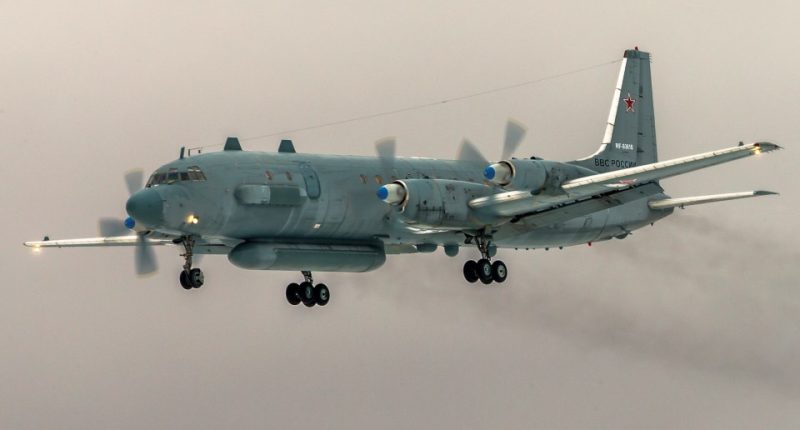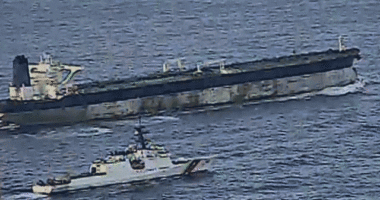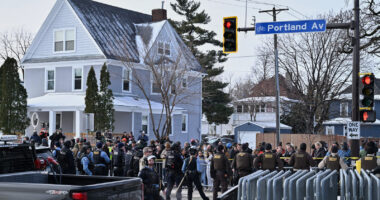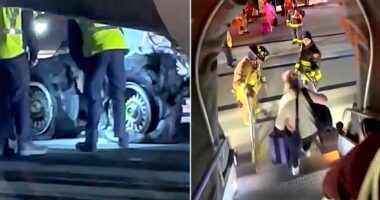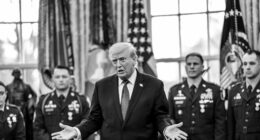Share this @internewscast.com
GERMAN fighter jets were dramatically scrambled to intercept a Russian spy plane over the Baltic Sea.
It came just hours before the Kremlin warned of a “direct” response to NATO’s growing presence on its doorstep.

Two Eurofighters roared into action on Friday after NATO radar spotted a Russian Il-20 with its transponder switched off.
The plane had taken off from Kaliningrad and was heading west toward Poland and Germany, according to Bild and The Kyiv Independent.
Germany’s quick reaction team made visual contact about 100km off the coast.
They captured a photo as the slow-moving Russian aircraft veered northward, keeping a distance of just 40km from the Baltic island of Usedom while remaining outside of German airspace.
It’s the ninth time this year German jets have been scrambled to shadow Moscow’s snoopers.
NATO says the Kremlin is using these flights to test alliance defences and gather intel on troop positions as the Ukraine war drags on.
This aerial incident occurred as Russian presidential spokesman Dmitry Peskov criticized Estonia’s readiness to host NATO aircraft equipped with nuclear weapons, describing it as a “direct” threat to Moscow.
“Directly, of course,” he said, when asked if such a move posed a threat, Russian news agency TASS reported.
Peskov ridiculed that Baltic leaders frequently make “absurd” remarks and remarked that the frosty relations could hardly deteriorate further: “It is very difficult to do anything worse.”
Tallinn’s Defence Minister Hanno Pevkur had earlier revealed Estonia is ready to welcome NATO jets capable of carrying tactical nuclear bombs — pointing to recent visits by US F-35s that could soon be guarding the tiny nation’s skies again.
It comes amid mounting alarm that Vladimir Putin is readying Russia for a showdown with NATO itself.
Bruno Kahl, head of Germany’s foreign intelligence service, recently warned “Ukraine is only a step on the journey westward,” adding: “We have intelligence showing it.”
NATO chief Mark Rutte piled on the pressure, saying the alliance must brace for the possibility of a Russian attack by 2030.
Putin’s forces have already begun amassing hardware and troops close to Finland, just 35 miles from the border, according to satellite snaps showing activity at four Russian bases — Kamenka, Petrozavodsk, Severomorsk-2 and Olenya.
Defence experts fear Moscow may attempt to provoke NATO into a limited clash, testing the alliance’s Article 5 pledge of mutual defence without triggering full-scale war.
Meanwhile on the battlefield, Putin’s summer push in Ukraine is grinding on at a snail’s pace, with Kyiv’s fierce drone attacks bogging down Russian advances.
After 448 days of fighting in Chasiv Yar in Donetsk, Moscow’s troops reportedly control just half the city — clawing back land at a rate so slow that even snails would outpace them.
But with an estimated 125,000 Russian soldiers massing along Ukraine’s Sumy and Kharkiv borders, Kyiv is bracing for what could be Putin’s last big gamble to seize ground before negotiating a ceasefire.
Ukrainian commander-in-chief Oleksandr Syrsky said his forces had managed to pin down a 50,000-strong Russian assault near Sumy, stabilising the lines for now.
Back in Germany, Chancellor Friedrich Merz poured more cold water on any thaw with Moscow, telling Süddeutsche Zeitung he won’t pick up the phone to Putin given Russia’s relentless bombing of Ukraine.
His predecessor Olaf Scholz had broken ranks last year by speaking with the Kremlin tyrant — but Merz insisted the time for friendly calls is over.
As Putin’s bombers continue to pound Kyiv and Odesa with hundreds of drones and missiles every night, NATO eyes remain fixed on the Baltic and beyond — wary that Moscow’s next gambit could spark the very clash the world fears most.
It comes after Ukraine landed another humiliating blow on Vlad’s war machine — blitzing two of Russia’s prized Su-34 fighter jets in a daring long-range drone strike.
Kyiv’s forces targeted the Marinovka military airfield in the Volgograd region, flying drones 200 miles to smash four of the £37million jets.
Two were destroyed outright, while the other pair were damaged, sending pro-war Russian Telegram channels into meltdown over the “multi-billion dollar” losses.
Furious Kremlin cheerleaders raged the attack “could and should have been prevented.”
Ukraine’s SBU boasted the strike sparked a fire in critical infrastructure used to prep and repair Russian warplanes.
Putin lashed out in brutal revenge. Overnight, Russia flattened a 21-storey tower block in Odesa, killing a married couple and wounding at least 14 others — including three children.

